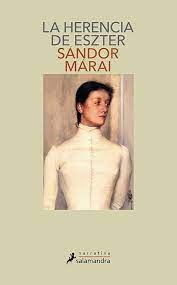
Original language: Hungarian
Original title: Eszter Hagyateka
Translation: Judit Xantus
Year of publication: 1939
Valuation: Alright
Since it’s not clear to me, when I finish reading I’m going to see what has been said about other works by Sándor Márai in this blog, where I know he has several reviews: well, nothing, almost all of it good, most of it Recommended, which speaks of a solid author, surely with a defined style that he maintains throughout his career, which perhaps does not completely excite but which in general convinces readers with a fine palate such as ULAD readers and reviewers, current and former. . I also see that the book was published at the end of the 1930s, perhaps the author’s most prolific period, and not long before what seems to be his most celebrated novel, The last meeting.
Then I think that perhaps I have done something wrong, that I have not read carefully enough or that I have not been able to detect the valuable things that the book offered. Because, the truth is, it seemed like a rather small thing to me, something that may have interested me at certain times but that ended up leaving me rather cold.
We talk about the Herencia de Eszterinheritance in a rather metaphorical sense, because this woman, who tells her story in the first person, does not seem to have received much more than the old house where she lives with Nun, one of those wet nurses who over the years become fully part of the family. Either he has not received more, or he has taken the rest Louiswho in some way is the indirect protagonist of the story. Louis He was one of those guys who seem to have their own light, who attract and conquer with their mere presence, distinguished, seductive, talkative, with exquisite education and who always has something to tell, to offer, to ask for. Especially the latter, because the knight, who always goes through life in search of adventures and infallible businesses, has an almost supernatural ability to cut down anyone who approaches him. Loans, guarantees, pawned jewelry, everything is not enough to finance his lifestyle and his investments.
But, as was to be feared, Ester She is still in love with the sheller, despite the fact that their lives have been separated for many years, and when her return is announced, the sensations and memories that the woman, already in her forties, calmly tells us calmly and as if defeated by her, come together. the fatality In this sense, she is a sad and resigned character, who seems to have nothing to put on the scale of life, only to wait, vegetate and barely move to the sound played by the reappeared seducer.
Of course, the fact that the characters are not likeable does not mean that the narrative is not convincing. But it seems that the grayness of Ester, His immobility and prostration for years are transmitted to the story as a whole, and in this way the sensations it generates are always more than tenuous, sclerotized. If we also consider that everything takes place indoors, it seems that we are facing a 19th century play, dominated by memories and dialogues, all of them fruitless, about a youthful love that has healed badly because one of its protagonists has not known how to accept a reality. that he knows very well.
Yes, the book is written neatly, with dignified and clear prose that makes reading enjoyable. It is clear that it is the product of a good writer, and there will be those who enjoy the sad musings of
Esterwhoever is expectant before the appearance of a Louis already mature and perhaps changed, or who is dazzled by the lateness of this somewhat nineteenth-century story. Personally, it seems like an old-fashioned story, without spark or depth, something in which we can spend a rainy afternoon but which most likely will not provoke any reaction or leave any mark on us.
Source: https://unlibroaldia.blogspot.com/2024/01/sandor-marai-la-herencia-de-eszter.html


